Photo credit: cloud.withgoogle.com
Google’s recent Google Cloud Next ’24 conference in Las Vegas was all about generative AI. The tech giant showcased how this game-changing technology is being woven into everything from creative tools to scientific research, changing the way we create and interact with information.
More Than Just Buzzwords: The Tech Behind the Magic
Google wasn’t just talking about applications; it was revealing the powerful engine under the hood. It introduced the Cloud TPU v5e, an AI accelerator optimized for cost-effective large language model inference. Plus, Google announced the A3 supercomputer VMs powered by NVIDIA H100 GPUs, designed for intensive generative AI workloads.
AI Everywhere: Google’s Bold Vision
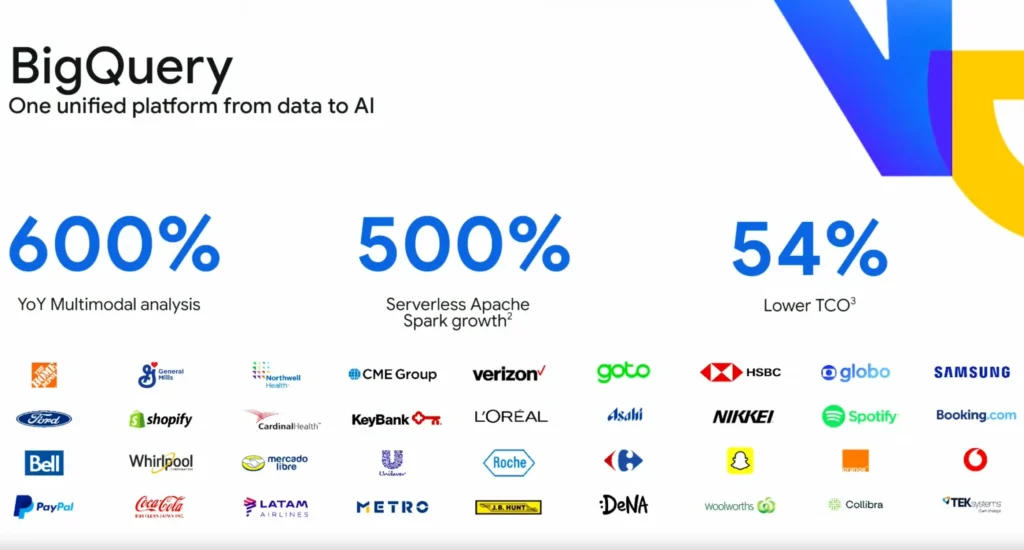
Google’s vision for generative AI is ambitious. They see it as a transformative force across industries, from healthcare and finance to manufacturing and education. This technology has the potential to streamline processes, boost productivity, and unlock entirely new possibilities. Google is already putting this into practice, even in consumer-facing products. Their new Magic Editor in Google Photos is a prime example, using AI to effortlessly transform your snapshots into frame-worthy memories. (If you’re curious to learn more, check out our article on Google Photos’ Magic Editor.
Your Data + AI = Smarter Insights
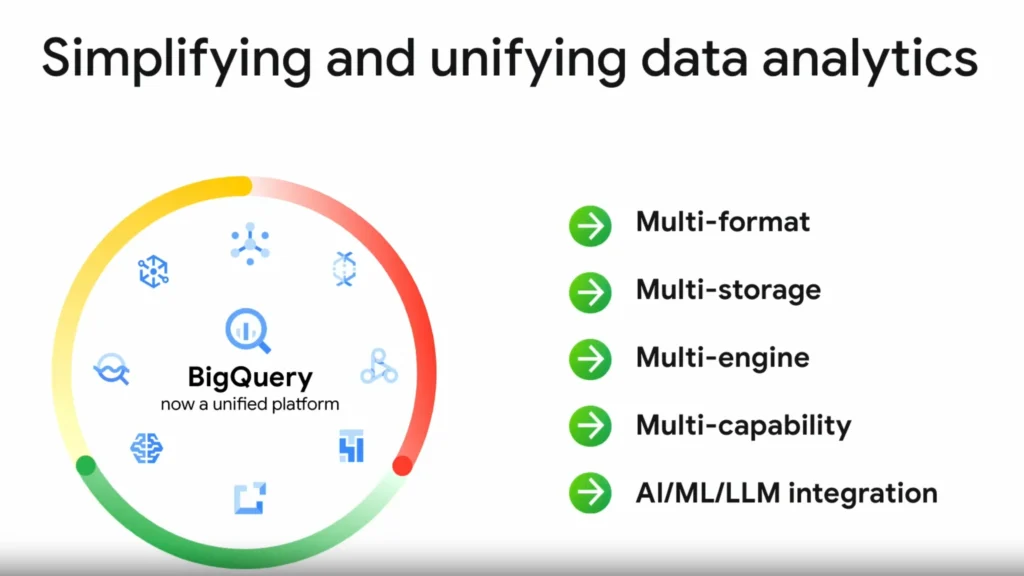
Google isn’t just stopping at model creation and deployment. They’re bringing the power of generative AI directly to your data warehouse with BigQuery. This integration opens up a whole new world of possibilities for data analysis and decision-making:
- Natural Language Queries: Instead of writing complex SQL queries, you can now simply ask questions about your data in plain English. BigQuery’s generative AI capabilities will understand your intent and translate it into the necessary queries to retrieve the relevant information.
- Automated Insights: BigQuery can now automatically generate summaries, reports, and visualizations from your data, saving you time and effort. Imagine getting a quick overview of your sales performance, customer trends, or marketing campaign results without having to manually sift through data.
- Deeper Analysis: Generative AI can help you uncover hidden patterns and insights in your data that you might not have discovered otherwise. For example, it can identify correlations between different data points, predict future trends, or cluster similar data points together.
- Enhanced Decision-Making: By making it easier to access and understand your data, generative AI empowers you to make more informed and data-driven decisions. This can lead to improved business outcomes, increased efficiency, and a competitive advantage.
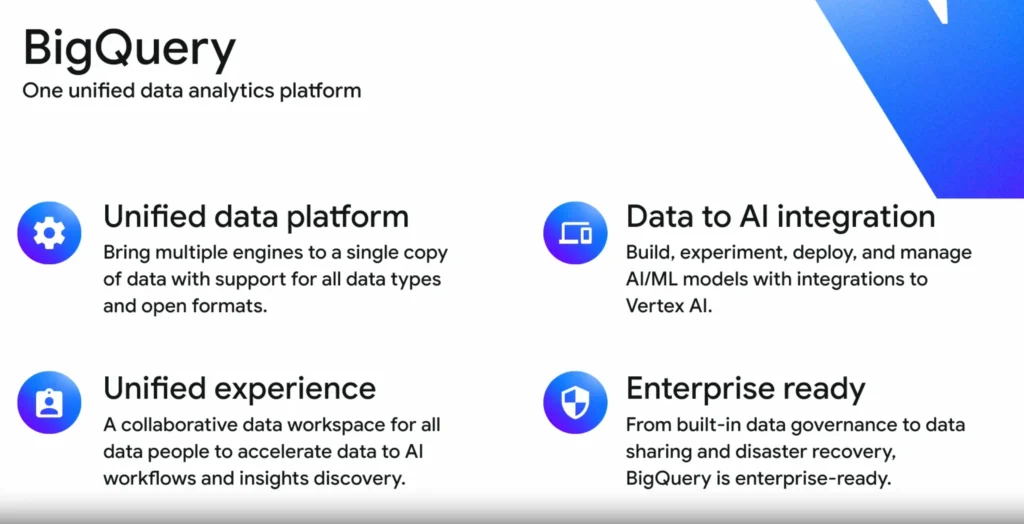
How It Works
Google is integrating Gemini models, including Gemini Pro, into BigQuery ML. This allows users to harness the power of generative AI through familiar SQL statements. You can use large language models (LLMs) to perform tasks like text summarization, sentiment analysis, entity extraction, and content generation directly within BigQuery.
Real-World Applications
Imagine a marketing team using BigQuery’s generative AI to quickly analyze customer reviews and identify emerging trends. Or a financial analyst using it to generate summaries of complex financial reports in seconds. The possibilities are endless, and this integration has the potential to revolutionize the way businesses work with data.
With the integration of generative AI into BigQuery, Google is making data analytics more accessible, intuitive, and impactful for everyone, regardless of their technical expertise.
Gemini: Google’s Multitalented AI Family
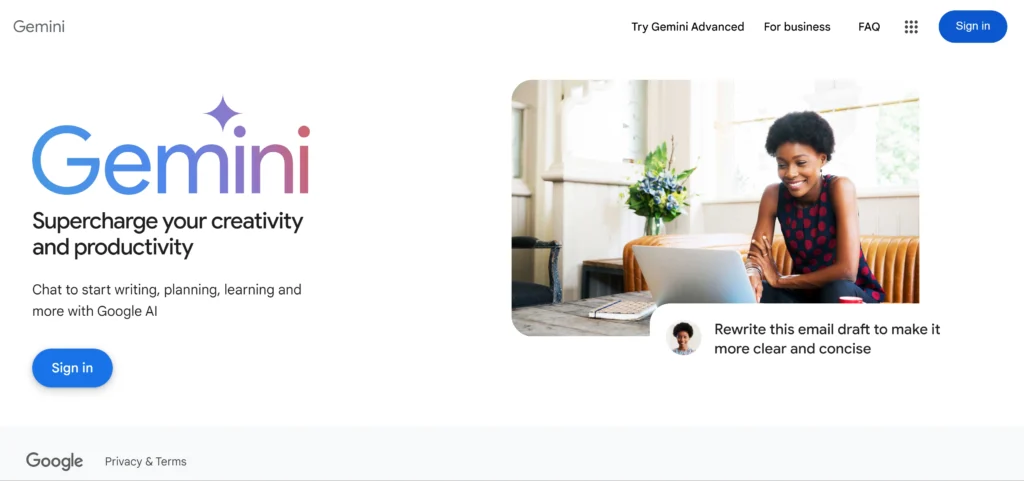
Google also unveiled the Gemini family of models, a powerful set of AI tools designed to understand and generate various types of content, including text, images, and code. These models are being integrated into Google Cloud products to enhance capabilities like coding assistance, cloud operations, and data analysis. Notably, Gemini 1.5 Pro, now in public preview, boasts a massive context window of up to 1 million tokens and the ability to process audio and video files. (For a deeper dive into Gemini, you can check out Google Cloud Blog)
Duet AI: Your AI Co-worker in Workspace
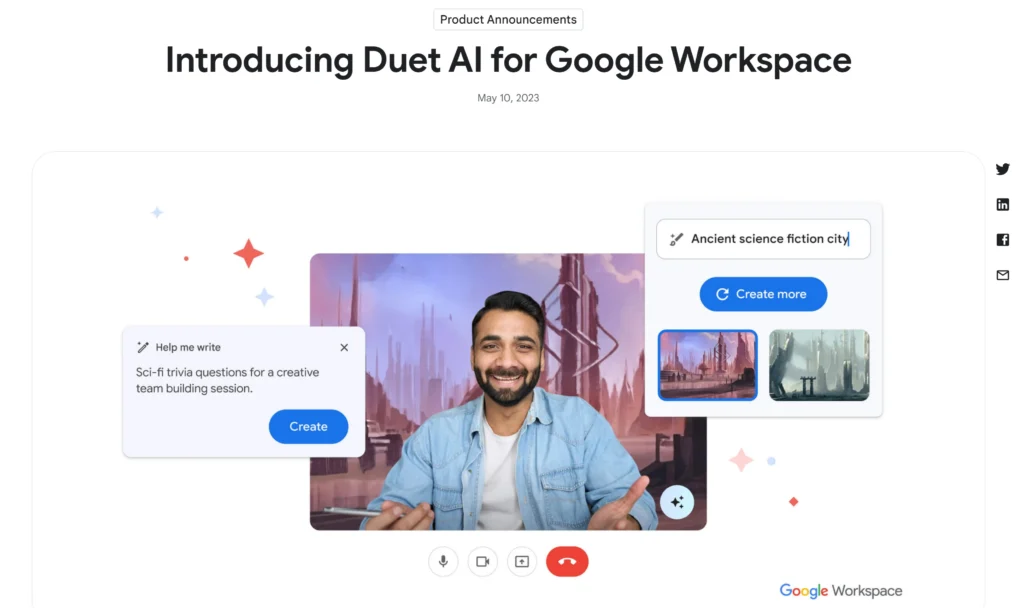
Google didn’t just announce Duet AI for Workspace at Cloud Next ’24 – they unleashed a productivity powerhouse. Duet AI is an AI-powered collaborator that’s seamlessly integrated into your familiar Workspace apps, ready to lend a helping hand whenever you need it.
Imagine this:
- Gmail: Duet AI can whip up an email draft based on a few bullet points, refine your tone, or even translate your message into another language.
- Docs: Need to summarize a lengthy report? Duet AI can clarify the key takeaways in seconds. Want to brainstorm ideas for a project? Duet AI can generate creative prompts and outlines.
- Slides: Duet AI can help you create visually stunning presentations, complete with custom images, text, and layouts.
- Sheets: Duet AI can help you generate insights, build formulas, and create custom plans based on your data.
- Meet: Late to a meeting? Duet AI can provide a real-time summary of what you missed and even take notes for you.
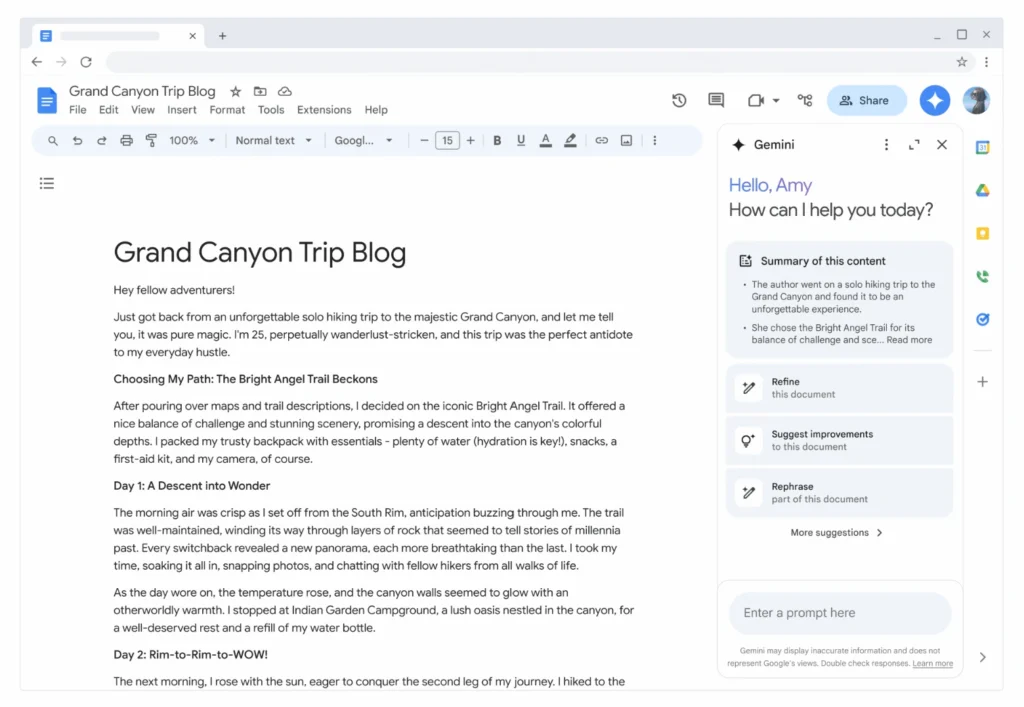
But Duet AI doesn’t stop there. It’s constantly learning and evolving, adding new capabilities to help you work smarter, not harder. For example, Duet AI can now:
- Generate images in Slides and Meet: Need a visual aid for your presentation? Duet AI can create images directly within Slides based on your text descriptions. It can also create custom backgrounds for your video calls in Meet.
- Help you write code in Colaboratory: If you’re a developer, Duet AI can help you write and debug code in Colaboratory, Google’s cloud-based notebook environment.
- Assist with project management in Spaces: Duet AI can help you manage projects in Google Spaces, suggesting tasks, deadlines, and even generating summaries of project discussions.
With Duet AI by your side, you’ll be able to tackle even the most challenging tasks with confidence and ease. It’s like having a personal assistant, creative partner, and data analyst all rolled into one – without the hefty price tag.
Responsible AI: Ethics and Security at the Forefront
Google emphasized its commitment to responsible AI development, highlighting new security features and initiatives to address potential risks like deepfakes and misinformation. They’re focused on building trust in AI by ensuring it’s used ethically and responsibly.
Customization and Control: Your AI, Your Way
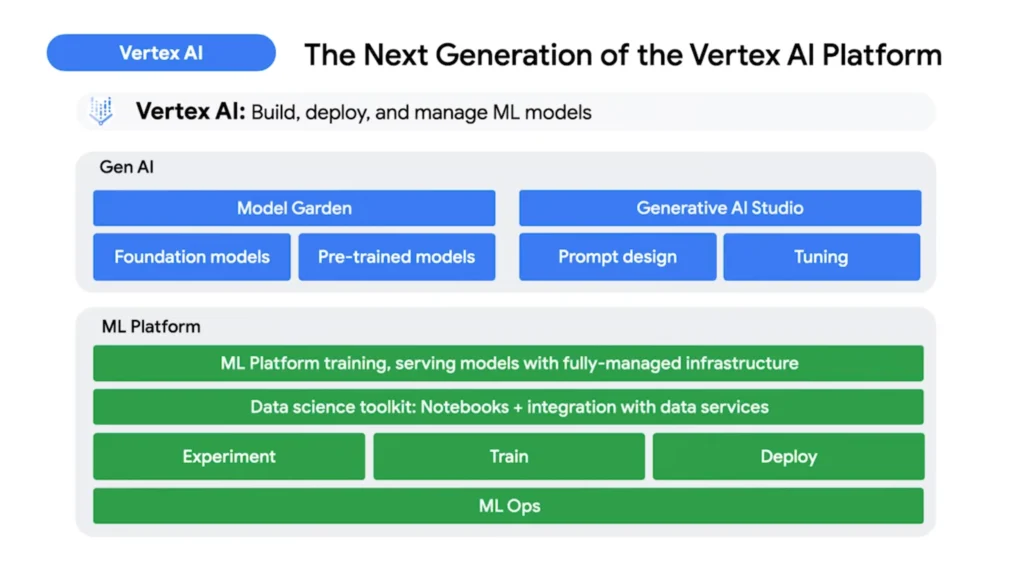
Google Cloud isn’t just handing businesses a one-size-fits-all AI solution. Recognizing that every organization has unique needs, they’re providing tools and platforms to tailor generative AI models for specific use cases. This includes:
- Model Garden: A curated collection of foundation models (like Gemini) that businesses can access and customize using their own data.
- Vertex AI: A platform that allows developers and data scientists to fine-tune models, experiment with different architectures, and easily deploy AI applications.
- Generative AI App Builder: A low-code tool that enables businesses to quickly create generative AI applications, such as chatbots or custom search engines, without extensive technical expertise.
Data Privacy and Security: Front and Center
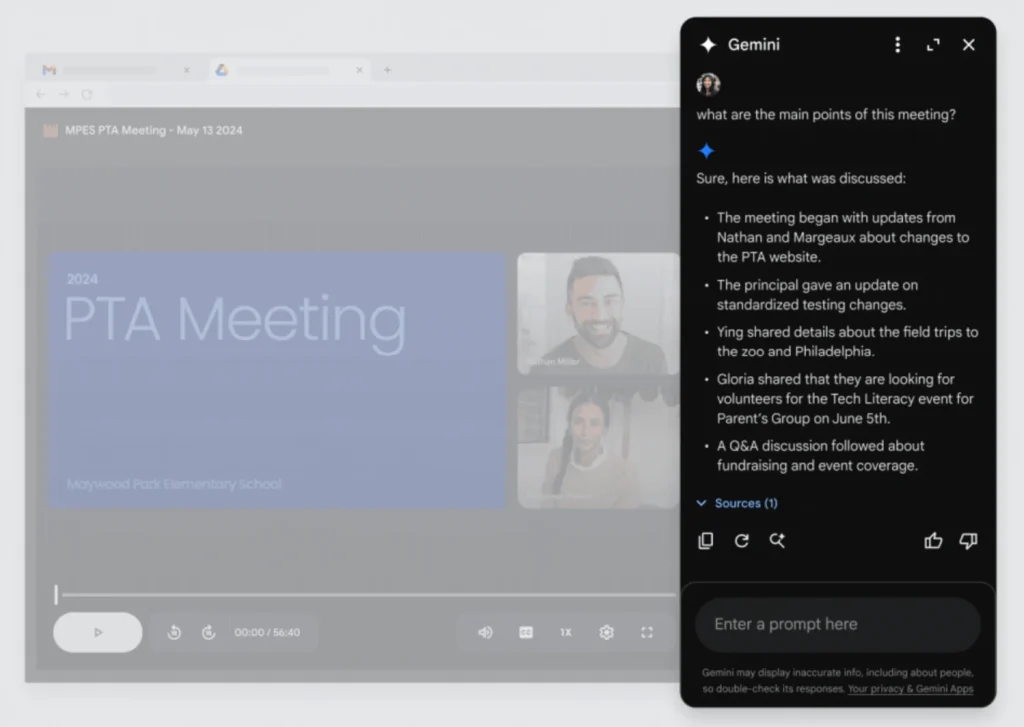
Google is well aware of the concerns surrounding data privacy and security when it comes to AI. They’re addressing these concerns head-on with features like:
- Customer-managed encryption keys: Businesses maintain control over their data by using their own encryption keys.
- Private model deployments: Models can be deployed in private environments, ensuring sensitive data remains confidential.
- Compliance with regulations: Google Cloud adheres to strict data privacy and security standards, helping businesses meet regulatory requirements.
By offering a combination of customization tools and robust security measures, Google Cloud is empowering businesses to leverage the power of generative AI while maintaining full control over their data and ensuring compliance with industry regulations. This approach is essential for building trust and making AI a valuable asset for organizations across all sectors.
Making Generative AI Accessible
One of the big takeaways? Google is making generative AI easier to use for everyone. It’s integrating generative AI features into Vertex AI, its platform for building and deploying machine learning models. This means businesses can tap into the power of generative AI without needing a team of AI experts.
Partnering for Innovation: Expanding the AI Ecosystem
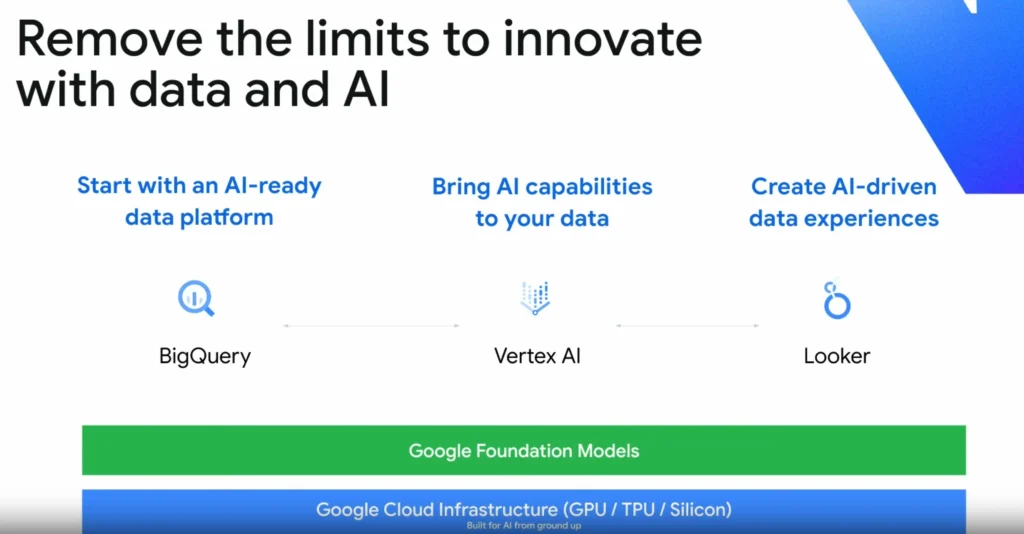
Google is actively collaborating with a wide range of partners to expand the reach and impact of generative AI. This ecosystem approach is designed to accelerate innovation and deliver tailored solutions for different industries and use cases.
For example, Google is partnering with:
- Replit: To bring generative AI capabilities to millions of developers, making it easier for them to build software applications.
- Salesforce: To integrate generative AI into Salesforce’s customer relationship management (CRM) platform, enhancing sales and marketing automation.
- UKG: To integrate Duet AI into UKG’s human capital management (HCM) solutions, streamlining HR processes and improving employee experiences.
- AI21 Labs: To make AI21’s Jurassic-2 family of large language models available on Vertex AI, giving developers access to cutting-edge AI models for various applications.
These are just a few examples of the many partners Google is collaborating with in the generative AI space. By working together, these companies are helping to drive innovation and make AI more accessible and beneficial for businesses and individuals alike.
Industry-Specific Applications: AI’s Real-World Impact
Generative AI isn’t just theoretical – it’s already making a difference for businesses around the world. The potential applications of generative AI are extensive and varied. In healthcare, it can accelerate drug discovery and personalize medicine. In finance, it can improve fraud detection and risk assessment. Retailers can leverage it for personalized recommendations and customer service, while manufacturers can optimize production processes. Even education is being transformed with personalized learning and intelligent tutoring systems.
The Future of AI: What’s Next?
The future of generative AI is bright, and Google is positioning itself as a leader in this transformative field. As this technology continues to evolve, it has the potential to reshape industries, enhance creativity, and redefine the way we work and live. While challenges remain, Google’s commitment to responsible AI development and its focus on practical applications are paving the way for a more innovative and inclusive future.
FAQs
What is generative AI, and how does it work?
At its core, generative AI is a type of artificial intelligence that can create new content – whether it’s text, images, music, or even code. It learns from existing data and uses that knowledge to generate original, creative outputs.
What are some examples of generative AI applications?
Generative AI can write emails, compose music, design logos, translate languages, and even generate code snippets. It’s already being used to create marketing copy, summarize articles, and power chatbots.
How is Google using generative AI in its products and services?
Google is integrating generative AI into a wide range of products, from Search and Gmail to Google Ads and Google Cloud. It’s also developing new tools and platforms specifically for building and deploying generative AI models.
Photo credits: Google





